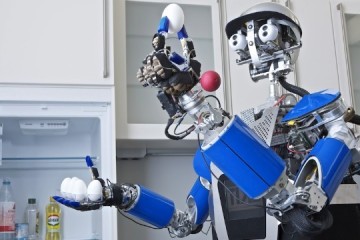Even a Robot Would Be Wasted in These Useless Jobs: Noah Smith

©2015 Bloomberg View
NPLH4I6JTSE8
(Bloomberg View) — Americans are worried about robots taking their jobs. Japanese people should be salivating at the prospect.
Japan continues to power ahead in the field of robotics. Although Japanese companies have lost their dominance in fields such as consumer electronics and semiconductors, in robots they remain supreme. Japanese companies hold 50 percent of the global market for manufacturing robots and 90 percent of the market for robot parts.
In fact, Japanese companies’ enthusiasm for robots goes way beyond industrial automation. Corporate and government leaders are fond of declaring that as the country ages and labor becomes scarce, robots will take over many jobs now held by humans, such as elder care.
But there’s something even better than robots that could replace large numbers of Japan’s human jobs: nothing.
Japan is a country famous for its low white-collar productivity; this is borne out by the statistics. Some of that comes from the reluctance by tradition-minded companies to adopt modern workplace technologies — there are still companies using fax machines or copying electronic documents onto paper. Some of it is from outdated management practices. Some of it is from employees staying at work for too many hours, long after their productivity has gone into free-fall. But some of it is certainly just a function of useless jobs. There are Japanese people being paid to do things that no one, not even a robot, should be paid to do.
Any American who has lived in Japan has a long list of anecdotes about jobs that seem utterly pointless. There are security guards being paid to guard vacant lots. There are women standing in elevators pushing the button for you. There are crossing guards at intersections with functional traffic lights.
Then there are the useful jobs for which Japanese companies simply hire too many personnel. You know that old joke about how “TSA” stands for “Thousands Standing Around”? That’s an even more apt description of a Japanese retail establishment. This is, of course, an anecdotal observation I have heard from many Japanese businesspeople, but the fall in equipment efficiency at Japanese retail companies corroborates the story.
Japan has a bunch of useless jobs that need to be eliminated. Replacing these humans with robots would be a waste of a robot. Cut the jobs, and let the humans go do something more useful.
My suggestion will undoubtedly be met with anger from those who think that the U.S.’s waves of corporate downsizing have been responsible for the rise in American unemployment since the 1970s. But these critics should think again. The U.S. employment rate as a percent of working-age population was higher than Japan’s for most of the past three decades, despite faster population growth. Low Japanese unemployment has largely been a function of fewer Japanese people declaring themselves to be in the labor force.
See, the so-called lump of jobs fallacy really is a fallacy. Many people think that if you eliminate an existing job, the number of available jobs in the economy goes down by one. But this is simply not support by the facts. The rate of job churn in any modern economy — even Japan’s — is much, much larger than the rate of net job creation or destruction. When people’s jobs are eliminated, they almost always find new things to do, unless the country is in a deep recession.
Of course, there are costs involved with eliminating an existing position — for example, if people have to retrain. But the skill of pushing an elevator button or guarding an empty lot isn’t exactly something that requires one to go back to school. And government can help laid-off people look for work, through websites and other services.
My call to eliminate useless jobs will also spark fear in Japanese politicians, who view the corporate welfare state as a means of curbing social unrest. But these leaders should ask themselves whether relentlessly declining wages, high costs and productivity stagnation are ultimately a greater threat to social stability than a reshuffling of workers to more productive jobs.
As Japan’s population ages and shrinks, the number of people looking for jobs will fall. But this makes the need to eliminate useless positions more urgent, not less. An older population means more productivity growth is needed to support an ever-increasing number of elderly people. Keeping smart young people pushing buttons in elevators isn’t the way to pay for grandma and grandpa’s retirement.
In my view, it’s nothing short of a human tragedy that so many young people in one of the world’s most skilled and educated nations should be relegated to useless positions, simply because of a fear of change. Replacing humans with robots is fine and good, but it’s even better to let humans switch to jobs where they don’t have to act like robots.
To contact the author on this story: Noah Smith at nsmith150@bloomberg.net To contact the editor on this story: James Greiff at jgreiff@bloomberg.net
For more columns from Bloomberg View, visit http://www.bloomberg.com/view







No Comment